
Porta Linguarum
Scope & Guideline
Connecting theory and practice in language education.
Introduction
Aims and Scopes
- Language Teaching Methodologies:
Explores various pedagogical approaches, including Content and Language Integrated Learning (CLIL), English as a Medium of Instruction (EMI), and project-based learning, focusing on their effectiveness in different educational settings. - Teacher Development and Well-Being:
Investigates the professional growth, emotional well-being, and identity of language teachers, emphasizing the importance of teacher support and development programs in enhancing teaching practices. - Language Acquisition and Learning Strategies:
Examines the cognitive and emotional factors that influence language learning, including the use of learning strategies, motivation, and self-regulation among learners. - Cultural and Intercultural Competence:
Addresses the importance of cultural awareness and intercultural communication in language education, focusing on how these elements impact language learning outcomes. - Technology in Language Education:
Analyzes the integration of digital tools and resources in language teaching, including mobile-assisted language learning, online education, and the use of multimedia resources to enhance learning experiences. - Assessment and Evaluation:
Discusses various assessment methods and their implications for language learning and teaching, including formative and summative assessments, and the use of innovative evaluation tools.
Trending and Emerging
- Emotional and Psychological Factors in Language Learning:
An increasing number of studies are exploring the role of emotions, motivation, and psychological well-being in language acquisition, indicating a trend towards understanding the learner's emotional landscape as essential for effective learning. - Digital and Online Learning Environments:
With the rise of technology, there is a growing emphasis on the effectiveness of online and blended learning environments, particularly in response to recent global shifts towards remote education. - Intercultural Communication and Global Citizenship:
Research is increasingly focusing on developing intercultural competence and fostering global citizenship among language learners, highlighting the importance of understanding diverse cultural perspectives. - Innovative Assessment Practices:
There is a trend towards exploring alternative assessment methods that promote learner autonomy and self-regulation, moving away from traditional testing towards more formative assessments that enhance learning processes. - Sociocultural Perspectives on Language Learning:
Emerging research is emphasizing the sociocultural context of language learning, including how identity, community, and social interactions shape educational experiences and outcomes.
Declining or Waning
- Traditional Grammar Instruction:
There appears to be a waning focus on conventional grammar teaching methods, as recent publications favor communicative and integrated approaches that prioritize fluency and contextual language use over rote grammar learning. - Textbook-Centric Approaches:
There has been a noticeable decline in discussions centered around traditional textbooks as primary instructional materials, with a shift towards more dynamic and interactive resources such as digital tools and multimedia content. - Standardized Testing:
Research related to standardized testing practices and their effectiveness in language learning contexts has decreased, possibly due to the growing emphasis on alternative assessment methods that prioritize learner engagement and holistic development. - Linguistic Theory without Practical Application:
Papers focusing solely on theoretical linguistic frameworks without practical implications for teaching and learning seem to be less prevalent, as the journal moves towards research that has clear applications in educational settings. - Focus on Native Speaker Norms:
The emphasis on achieving native-like proficiency is diminishing, with more research highlighting the value of multilingualism and the acceptance of diverse language varieties in educational contexts.
Similar Journals
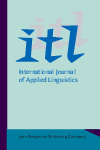
ITL-International Journal of Applied Linguistics
Elevating academic dialogue in the realm of applied linguistics.ITL-International Journal of Applied Linguistics, published by JOHN BENJAMINS PUBLISHING CO in Belgium, stands as a leading journal in the field of applied linguistics and education, recognized for its rigorous scholarship and impactful contributions. With an impressive ranking of Q1 in both the Education and Linguistics and Language categories, ITL holds its place among the top journals globally, featuring in the Scopus rankings with a notable 91st percentile in both Arts and Humanities as well as Social Sciences. The journal aims to disseminate innovative research exploring the intersection of linguistics, language acquisition, and pedagogical practices, fostering a rich academic dialogue among researchers, educators, and practitioners. Though not currently an open access journal, ITL remains accessible to a broad readership, with an emphasis on high-quality, peer-reviewed articles that inform and inspire advancements in applied linguistics. The journal's commitment to academic excellence and relevance makes it an essential resource for those seeking to understand and contribute to the dynamic landscape of language studies.
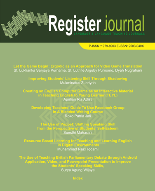
REGISTER Journal
Illuminating paths in Islamic studies since 2008.Welcome to the REGISTER Journal, an esteemed publication in the field of Islamic studies and education, dedicated to advancing knowledge and fostering critical dialogue since its inception. Published by Univ Islam Negeri Salatiga, the journal operates under an Open Access model, empowering researchers, practitioners, and students worldwide with unrestricted access to its scholarly content since 2008. With the ISSN: 1979-8903 and E-ISSN: 2503-040X, REGISTER Journal aims to disseminate innovative research, insightful reviews, and thought-provoking discussions that contribute to the vibrant tapestry of Islamic scholarship. By fostering a collaborative environment for sharing ideas, REGISTER serves as a crucial platform for educators, researchers, and students seeking to deepen their understanding of contemporary issues within the Islamic context. Join us in exploring the intersections of thought, culture, and education in this engaging and dynamic journal.
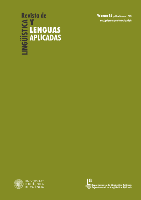
Revista de Linguistica y Lenguas Aplicadas
Innovative Insights for the Linguistic CommunityRevista de Linguistica y Lenguas Aplicadas, an esteemed journal published by UNIV POLITECNICA VALENCIA, EDITORIAL UPV, is a pivotal resource in the field of linguistics and applied languages. Since its inception, the journal has embraced Open Access publishing since 2006, ensuring that its rich repository of research is readily available to a global audience of researchers, academics, and language professionals. Headquartered in Valencia, Spain, the journal contributes significantly to the advancement of linguistics knowledge, boasting a respectable ranking within the Q3 quartile for Linguistics and Language (2023) according to Scopus metrics. It covers a diverse range of topics and methodologies, engaging readers through its commitment to scholarly rigor and innovation. The journal is uniquely positioned to inform and inspire essential discussions from 2015 to 2024, making it a vital platform for emerging linguists and seasoned scholars alike, as they explore the evolving landscapes of language and communication.
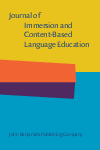
Journal of Immersion and Content-Based Language Education
Empowering Language Through Immersive ExperiencesJournal of Immersion and Content-Based Language Education, published by JOHN BENJAMINS PUBLISHING CO, is a leading academic journal dedicated to the fascinating intersection of language education and immersive learning experiences. With its ISSN 2212-8433 and E-ISSN 2212-8441, the journal has carved a prominent niche in both the Education and Linguistics fields, earning a Q2 ranking in Education and a prestigious Q1 ranking in Linguistics, as noted in 2023. Situated in the Netherlands, this journal caters to a global audience, offering access to cutting-edge research and methodologies in content-based language instruction. Committed to fostering scholarly dialogue, the Journal of Immersion and Content-Based Language Education empowers researchers, educators, and students alike to explore innovative practices and theoretical frameworks. With a Scopus ranking reflecting its impact in the field—#196/1088 in Language and Linguistics at the 82nd percentile and #807/1543 in Education—this journal is a vital resource for those committed to enhancing linguistic education through immersive methodologies.
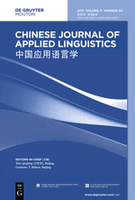
Chinese Journal of Applied Linguistics
Fostering dialogue on contemporary linguistic challenges.The Chinese Journal of Applied Linguistics, published by the esteemed FOREIGN LANGUAGE TEACHING & RESEARCH PRESS, serves as a premier platform for scholars and practitioners in the field of linguistics, specifically focusing on the application of linguistic research in real-world contexts. With an ISSN of 2192-9505 and an E-ISSN of 2192-9513, this journal is distinguished by its position in the Q1 category for Linguistics and Language as of 2023, underscoring its influence and prestige within the academic community. Notably, it ranks 248th out of 1,088 in the Arts and Humanities field and 292nd out of 1,167 in Social Sciences, reflecting a strong percentile rank of 77th and 74th respectively. This journal aims to contribute to the advancement of applied linguistics through innovative research articles, comprehensive reviews, and critical discussions on contemporary issues in language learning and teaching, thereby attracting a diverse readership of researchers, educators, and students who are keen on exploring new linguistic paradigms. With its scope spanning from 2017 to 2024, the Chinese Journal of Applied Linguistics is committed to disseminating cutting-edge insights and fostering dialogues that propel the discipline forward, making it an essential resource for anyone engaged in the study of language and its applications.
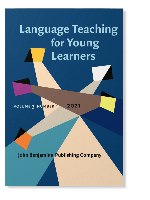
Language Teaching for Young Learners
Fostering linguistic growth in young minds.Language Teaching for Young Learners, published by John Benjamins Publishing Co, is a premier journal dedicated to enhancing the pedagogy of language acquisition in early childhood education. Since its inception in 2019, it has rapidly established itself within the research community, reflected by its high Scopus rankings—placing it in the 85th percentile for Language and Linguistics and the 84th percentile for Education. The journal aims to provide a platform for innovative research, practical insights, and theoretical discussions surrounding the teaching of languages to young learners, thus contributing significantly to the fields of Education and Linguistics. With an open access model currently unavailable, it caters to a diverse global audience, including researchers, educators, and policy-makers, keen on improving pedagogical practices. Located in the Netherlands, the journal's commitment to academic excellence is evident through its Q1 and Q2 rankings in Linguistics and Language and Education respectively, encouraging continual discourse in cultivating effective language education practices.
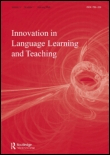
Innovation in Language Learning and Teaching
Fostering Excellence in Language Learning through Innovation.Innovation in Language Learning and Teaching is a premier peer-reviewed journal published by Routledge Journals, Taylor & Francis Ltd, focusing on the intersection of innovative practices in language education and teaching methodologies. With a notable impact factor reflected in its recent placement in the Q1 quartile for both Education and Linguistics and Language categories, this journal serves as a crucial resource for scholars and practitioners aiming to enhance pedagogical approaches and improve learning outcomes in language education. Spanning from 2009 to 2024, it showcases cutting-edge research that addresses contemporary challenges in the field, facilitating a deeper understanding of language acquisition, pedagogy, and curriculum development. The journal is indexed in Scopus, demonstrating its significant contribution to the academic community, with impressive ranks in both the Arts and Humanities as well as the Social Sciences categories. Although it follows a traditional subscription model, the journal is committed to disseminating high-quality research that fosters collaboration and discussion among researchers, educators, and students dedicated to advancing language learning and teaching practices.

Language Learning in Higher Education
Cultivating excellence in language acquisition methodologies.Language Learning in Higher Education is a prominent academic journal published by DE GRUYTER MOUTON, dedicated to exploring the intricate dynamics of language acquisition and pedagogical practices within the higher education context. With a robust ISSN: 2191-611X and E-ISSN: 2191-6128, this journal provides a platform for innovative research that addresses contemporary challenges and methodologies in language education. The journal enjoys a favorable reputation in the academic community, as evidenced by its ranks in the Scopus database, where it holds a position in the 67th percentile for Language and Linguistics and is classified in the Q3 and Q2 quartiles across relevant education and linguistics categories. Since its convergence in 2017, Language Learning in Higher Education aims to enrich scholarly discourse by publishing high-quality articles that foster insights into effective language learning strategies, thus serving as an essential resource for researchers, educators, and students committed to enhancing language education. The journal's editorial team is devoted to advancing the field through rigorous peer-review processes and welcomes contributions that push the boundaries of language learning research.

Foro de Profesores de E-LE
Innovating Teaching, Transforming LearningForo de Profesores de E-LE is a premier open-access journal dedicated to the dissemination of scholarly knowledge in the field of electronic language education. Published by Universidad de Valencia, this journal has been servicing the academic community since 2005, offering a platform for researchers, educators, and practitioners to share their insights and advancements. With a focus on innovative teaching methodologies, digital resources, and the integration of technology in language instruction, Foro de Profesores de E-LE plays a critical role in enhancing language education in the digital age. Its commitment to open access ensures that research is readily available to a global audience, promoting collaboration and ongoing dialogue among scholars and professionals. Whether you are a researcher looking to publish cutting-edge findings or a student eager to explore the latest trends in E-LE, this journal is an indispensable resource in the landscape of language education.
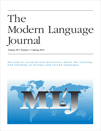
MODERN LANGUAGE JOURNAL
Pioneering Research in Language Education Since 1916The MODERN LANGUAGE JOURNAL, published by WILEY, stands as a premier academic resource in the field of linguistics and language studies. With its strong legacy dating back to 1916, this journal has evolved to address contemporary issues and trends in language learning, teaching, and research. It holds a prestigious Q1 ranking in both Linguistics and Language categories as of 2023, reflecting its high impact and relevance in scholarly discourse, supported by notable Scopus rankings that place it in the top percentiles of its field. The journal serves as an essential conduit for researchers, educators, and students seeking to contribute to and stay abreast of advancements in language education and linguistic theory. Although it does not currently offer open access options, the journal remains committed to disseminating significant findings that inspire innovative methodologies within the realm of modern languages.